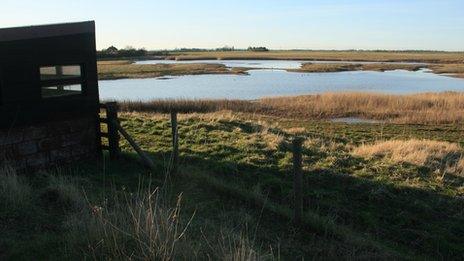Gibraltar Point's breeding birds prone to attack during drought
- Published

Wardens said any new chicks would find it difficult to feed in the dry mud
Drought conditions at a Lincolnshire nature reserve are leaving breeding birds open to attack from predators, staff have said.
Wardens at Gibraltar Point Nature Reserve, near Skegness, said birds such as avocets, which nest on the ground, are more prone to attack by foxes.
The shortage of fresh water has also had an adverse effect on the numbers of toads, frogs and dragonflies.
The water level on the reserve is 1ft (30 cm) below average.
This means that predators are able to access nests by land normally submerged under water.
The reserve has already reported a decline in the number of both breeding and wintering birds and said fewer nesting birds will have a "cumulative effect" on numbers in years to come.
Reserve warden Kevin Wilson said the dry conditions could also lead to an increase in algae, which could "swamp the ponds and lagoons, causing them to stagnate".
He said higher salt levels could also make the habitats unsuitable for toads and frogs in the future.
- Published20 March 2012
- Published22 March 2012
- Published3 December 2011